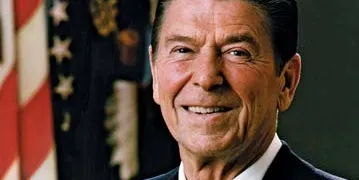Ronald Reagan, the 40th President of the United States, served two terms from 1981 to 1989. A charismatic leader known for his affable personality and persuasive communication skills, Reagan left an indelible mark on American politics and global affairs.
Born on February 6, 1911, in Tampico, Illinois, Reagan’s early life was humble. He graduated from Eureka College in 1932 with a degree in economics and sociology and then embarked on a career in radio broadcasting before moving to Hollywood in 1937. As an actor, Reagan appeared in over 50 films, gaining national recognition. His political views began shifting from liberal to conservative during his tenure as president of the Screen Actors Guild, where he fought against Communist influence in Hollywood.
Reagan’s political career took off when he was elected Governor of California in 1966, serving two terms until 1975. His governance was marked by tax reforms, welfare cuts, and a staunch stand against student protests, which showcased his conservative philosophy.
In 1980, Reagan won the presidency, defeating incumbent Jimmy Carter. His economic policies, dubbed “Reaganomics,” focused on tax cuts, deregulation, and reducing government spending. These measures were designed to stimulate economic growth, control inflation, and reduce unemployment. While his policies led to a significant economic recovery and were credited with creating millions of jobs, critics argued they increased income inequality and national debt.
Reagan’s presidency was also defined by his foreign policy, particularly his staunch anti-communism stance. He referred to the Soviet Union as the “Evil Empire” and escalated the arms race, including the Strategic Defense Initiative (SDI), a proposed missile defence system. His administration provided support to anti-communist movements worldwide, including the Contras in Nicaragua and the Mujahideen in Afghanistan.
A hallmark of Reagan’s foreign policy was his relationship with Soviet leader Mikhail Gorbachev. Their summits and negotiations led to significant arms reduction treaties, most notably the Intermediate-Range Nuclear Forces (INF) Treaty in 1987, which helped de-escalate Cold War tensions.
Reagan survived an assassination attempt in 1981, which bolstered his popularity and demonstrated his resilience. His communication skills earned him the nickname “The Great Communicator,” and his optimism and confidence in American values resonated with many citizens.
Reagan left office in 1989 with high approval ratings. He retired to his California ranch, where he later revealed he had been diagnosed with Alzheimer’s disease. Reagan passed away on June 5, 2004, but his legacy endures, influencing conservative politics and economic policies. His tenure is often credited with reviving American morale and reshaping the global geopolitical landscape.
newshub


Recent Comments